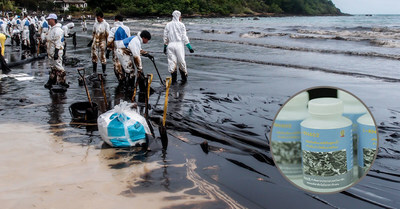[PRNewswire] Chula Launches "Microbes to Clean Marine Oil Spill Bioproducts"
전체 맥락을 이해하기 위해서는 본문 보기를 권장합니다.
"Usually, managing oil spills starts with physical methods, like oil booms, or oil dispersants followed by biodegradation, which is slow and unpredictable. So, if the biodegradation process can be accelerated, it should bring about major benefits," said Assoc. Prof. Dr. Onruthai who then turned to "oil-eating microbes".
본고는 자료 제공사에서 제공한 것으로, 연합뉴스는 내용에 대해 어떠한 편집도 하지 않았음을 밝혀 드립니다.
이 글자크기로 변경됩니다.
(예시) 가장 빠른 뉴스가 있고 다양한 정보, 쌍방향 소통이 숨쉬는 다음뉴스를 만나보세요. 다음뉴스는 국내외 주요이슈와 실시간 속보, 문화생활 및 다양한 분야의 뉴스를 입체적으로 전달하고 있습니다.

(BANGKOK, Oct. 3, 2022 PRNewswire=연합뉴스) Chula Faculty of Science has developed bioproducts to clean up marine oil spills from a research on oil-eating microbes while getting ready to expand to industrial-scale production for ecological sustainability.
Major marine oil spills that leave residual pollutants have detrimental effects on the economy, tourism, as well as the marine environment in the long run. One solution is oil-eating microbes bioproducts developed with clean technology by the Center of Excellence in Microbial Technology for Marine Pollution Treatment, Department of Microbiology, Faculty of Science, Chulalongkorn University, under the supervision of Associate Professor Dr. Onruthai Pinyakong.
Concept Origins
"Usually, managing oil spills starts with physical methods, like oil booms, or oil dispersants followed by biodegradation, which is slow and unpredictable. So, if the biodegradation process can be accelerated, it should bring about major benefits," said Assoc. Prof. Dr. Onruthai who then turned to "oil-eating microbes".
Thailand - the source of quality and diverse microorganisms
To accelerate the biodegradation process, sufficient quantities of effective oil-eating microbes developed into bioproducts with a long shelf life must be used.
Thailand has high biodiversity -- a good source of pollutants-degrading microorganisms. Pollutant eating and biosurfactants producing microorganisms were thus selected from previously contaminated sites with high biodiversity such as marine sediments, sediments from mangrove forests, as well as water or soil contaminated with petroleum hydrocarbons. They were then cultured and multiplied while ensuring that the isolated microorganisms are not pathogenic, and safe for users and the environment. The isolated toxins-digesting microbes, aka oil-eating microbes, were then developed into 3 types of lab products:
- Ready-to-use liquid formula suitable for contaminated sand or soil.
- Microbial product pellets suitable to treat contaminated soil or sand while promoting aeration and biodegradation.
- Microbial immobilization suitable for contaminated water.
Expanding research into industrial production
This research has received widespread feedback and support from both the public and private sectors who give much importance to the Bio-Circular-Green Economic Model which is in line with the Sustainable Development Goals (SDGs) of the United Nations.
If these bioproducts to clean marine oil spills can reach commercial-scale production and use, they will be part of the BCG Economy using truly clean technology, which the research team is ready to transfer to investors and interested parties to collaborate and develop in the future.
For more information, visit https://www.chula.ac.th/en/highlight/84839/
Source: Chulalongkorn University Communication Center
[편집자 주] 본고는 자료 제공사에서 제공한 것으로, 연합뉴스는 내용에 대해 어떠한 편집도 하지 않았음을 밝혀 드립니다.
(끝)
출처 : PRNewswire 보도자료
Copyright © 연합뉴스 보도자료. 무단전재 및 재배포 금지.
- 李대통령, 내달 1∼4일 싱가포르·필리핀 방문…AI·원전 논의 | 연합뉴스
- 李대통령 "투기용 1주택도 매각이 유리하도록…정책 총동원" | 연합뉴스
- 위기에도 최대실적 낸 쿠팡…1%대 이익률 숙제·탈팡타격 현실화 | 연합뉴스
- 합수본, '신천지 당원 가입 의혹' 국민의힘 당사 압수수색 | 연합뉴스
- 노란봉투법 교섭창구 최소 2개…원·하청 노조간 '분리'가 원칙 | 연합뉴스
- '유관순 조롱' 공분에도…경찰, '낡은제도' AI 모독 수사 못하나(종합) | 연합뉴스
- [정신건강 사각지대] ① 유명무실 정신질환자 강제입원심사 진술권…단 2건 행사 | 연합뉴스
- 1월 국세 53조 걷혀, 작년보다 13%↑…부동산·주식거래 증가 | 연합뉴스
- 경찰, 김병기 하루만에 재소환…이틀째 '13개 의혹' 마라톤조사 | 연합뉴스
- '색동원 사건' 검찰로…"조직적 은폐 의혹·추가 피해 밝혀내야" | 연합뉴스